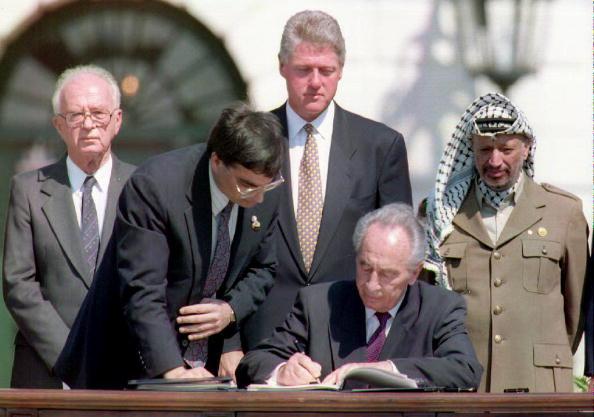'Keep his dream alive': Shimon Peres death a rallying cry for Middle East peace process
World leaders and campaigners say Israeli statesman’s memory should be respected with a renewed commitment to peace

The death of Nobel Peace Prize laureate and former Israeli president and prime minister Shimon Peres has led to renewed calls for peace in the Israeli-Palestinian conflict.
Pointing to the Israeli founding father’s legacy in the unprecedented drive for normal relations with Palestine in the 1993 Oslo Accords, the onus is on Israel’s current administration to build on Peres’ work in a region where his dream has often proved elusive, campaigners say.
“Shimon Peres's role in Israel-Palestine negotiations… should be the spur for a renewed drive for peace and justice,” Labour leader Jeremy Corbyn said in a statement on Twitter.
Over a 66-year-long career in politics, Peres helped establish the state of Israel under his mentor David Ben-Gurion, building up the country’s military strength and supporting the establishment of settlements in the West Bank. By the 1980s his politics had moved to the centre, and he became a tireless advocate for a two state solution in the Israeli-Palestinian conflict.
In the 1993 peace talks with Palestinian Liberation Organisation leader Yasser Arafat Mr Peres worked to get Palestine recognised by Israel as a negotiating partner and agreed to further consideration of issues such as Israeli settlements, the status of Jerusalem, and the Palestinian right to return.
In later life he was beloved as a public figure by most of Israel in his largely ceremonial role as president between 2007-2014. He was viewed abroad as a reassuring counterbalance to some of the more hawkish policies adopted by Israel’s current right-wing prime minister Benjamin Netanyahu, including settlement expansion in the West Bank which extends over the Green Line agreed upon in 1967.
Remembering the Israel-Gaza conflict
Show all 12Peres himself was dismayed at some of the Netanyahu adminstration's actions, which he thought could endanger the possibility of a two-state solution.
“Israel should implement the two-state solution for her own sake, because if we should lose our [demographic] majority, and today we [and the Palestinian population] are almost equal, we cannot remain a Jewish state or a democratic state. That’s the main issue, and to my regret they [the government] do the opposite,” he said in 2015.
High Representative of the European Union Federica Mogherini said on Wednesday that the “only way to honour [Mr Peres'] memory is by heading towards a two state solution,” calling the statesman a “man of peace and immense source of inspiration.”
Her words were echoed in a statement from former US President Bill Clinton and Democratic presidential nominee Hillary Clinton.
“His critics called him a dreamer. That he was - a lucid, eloquent dreamer until the very end. Thank goodness,” they said. “Let those of us who loved him and love his nation keep his dream alive."
An aide of the president of the Palestinian Authority, Mahmoud Abbas, mourned Mr Peres as a "man of peace" whose death is “a great loss to humanity and the region.”
Mr Peres established the Peres Peace Centre, where he worked on Arab-Israeli co-existence programmes right up until he died.
Subscribe to Independent Premium to bookmark this article
Want to bookmark your favourite articles and stories to read or reference later? Start your Independent Premium subscription today.

Join our commenting forum
Join thought-provoking conversations, follow other Independent readers and see their replies